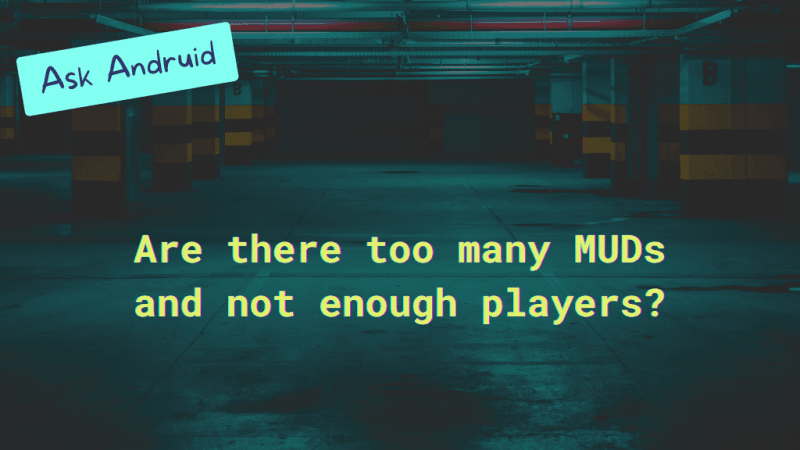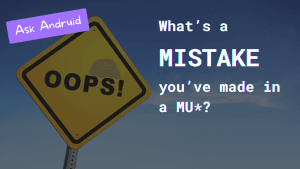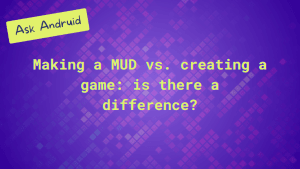Dear Andruid,
I have dreamed of making my own [multi-user dungeon] game for a long time, but it seems like there are a lot of people making games like this already nowadays? Is there any point to it anymore? I see people complain that there are too many games and not enough people to play with them.
– Discouraged Dreamer
Thoughts on the ‘too many games, too few players’ complaint
Dear Discouraged Dreamer,
You’re not alone in your observation! People do complain that there are too many games and not enough players. I’ve addressed this before, and I was just talking to a friend about it in DMs the day before yesterday.
But depending on why you want to build a MUD, you really shouldn’t let this idea of “too many games, not enough players” discourage you.
Actually, asking yourself why you want to build a MUD is a really good place to start your journey.
Before you ever start looking at codebases or sketching out mechanics or diving into the lore, you should be asking yourself this question.
Why ask why? Because it can steer you in the right direction, help you set appropriate goals, level-set expectations, and avoid unnecessary disappointment later.
So before you do anything else: stop, pull out a piece of paper, and jot down an answer the question:
Why do you want to make a MUD?
A mini manifesto for MUD Creators
There are a lot of reasons someone might want to make a MUD:
- to build their own world
- to bring back a style of game they loved
- to try out new mechanics and ideas
- to learn to code, write, or design
- to create something small and personal
- to experiment with community, narrative, or systems
All of these are valid.
MUDs are one of the easiest ways to start building your own dynamic, interactive world. Not always the fastest – depending on your bandwidth and ambitions, it can take years – but the barrier to entry is pretty low.
As a creator, yes, you might be concerned with how many players you can get. That’s to be expected, since MUDs are meant to be multi-user, after all.
But don’t let the claim that there are “too many games, not enough players” be what stops you from writing your first line of code.
The mere existence of other games does NOT define the success of your own.
Defining what success looks like
At its core, a MUD is simply a multiplayer game played primarily through text. That’s it. That’s the definition, in my view.
So don’t buy into the idea that a MUD has to be:
- a game with hundreds of skills and dozens of crafts
- sprawling with huge areas and thousands of rooms
- something people can grind for 8 hours a day for decades
- endlessly playable or with ever-expanding content
- designed to appeal to everyone and every play style
A MUD can also be:
- a game you can beat in a week with friends
- a short, shared adventure with a clearly defined end
- a social hangout, a puzzle, or a personal experiment
- a virtual tabletop (VTT)
In fact, you only need to look as far as the MUSH community to see that the following approaches are perfectly viable:
- a game with very few predefined rooms, objects, and NPCs
- a game with an ending, where players know in advance that they won’t be playing indefinitely
- a game that targets a particular audience or play style, such as players who like to write stories together
The point is: don’t let preconceived notions constrain you. It’s okay to experiment and think outside the box.
You’re the one who gets to decide what success looks like – and success should be based on YOUR why, YOUR goals.
Of course, sometimes people just want to create their own vision of something that came before, and that’s okay, too.
A wonderful thing about the MUD format is that it’s flexible enough to accommodate both nostalgia and new ideas.
That said, if your dream is to build the next big game, do be realistic:
A popular, large-scale MUD will require devoting most of your time to it – or working with a proactive, motivated, and capable team. You’ll need an active Discord to help attract and build a community of players, and then you’ll need to manage that community. In short, you’ll need to wear a lot of hats.
This is why it’s so important to understand why you want to build a MUD.
If your main reason for making a MUD is to create something that will be enjoyed by hundreds of players for a long long time, that’s a pretty lofty goal. Doable, but not easy.
It’s very different from saying, “I want to make a MUD because MUDs are cool and I want to learn how to code.” (My main reason for creating a MUD, btw. 😂)
Your why is what determines your goals and success criteria, so be honest with yourself about it. Make sure you’re setting realistic goals – or at least going into the project with eyes open.
Nostalgic fatalism is not the answer
From the player’s perspective, I get it. People miss having more folks to play with.
Hearing more people talk about building MUDs than playing them can be discouraging – and can make it feel like an already tiny community is shrinking out from under you.
But other games being made is not the problem. The niche has a lot of OTHER problems (don’t get me started, ha), but more people making games is not one of them.
And despite how it may seem, brand new players are still finding their way into the niche. And oldbies return after years away, sometimes in search of a new MUD to call home.
Okay, sure, it may be more of a trickle than a stampede, but you know what doesn’t bring in new players?
- having a doom-and-gloom attitude – generally not helpful
- subscribing to nostalgic fatalism – i.e. the idea that the “Golden Age” of MUDs has already passed, and that we’re all just here experiencing their slow death… also not helpful
- using gatekeeping language – as in, implying that only certain games deserve to exist because the available player pool is “too small” … you can guess how I feel about that
- reinforcing a scarcity mindset – meaning, talking about players like they’re a dwindling resource that has to be competed over; instead, we should be welcoming players into the broader community – and helping them find the game that’s the best fit for them
So here’s what I say: be like Faraday and don’t put too much stock in the naysayers.
If you want to make a MUD (or a MU* engine, for that matter) – make one. For yourself, for your skills, for the fun of building something and seeing it in motion.
Even if your game only attracts a handful of people, you’ll still come away with something valuable: experience, skills, a project you can point to.
I’ve seen people use MU* development to learn to code, to get dev jobs, and to show off their work. These, too, are valid reasons to make a MUD.
So start where you are and see where it takes you. When you understand your reasons, you can set your own definition of success – and work toward it at your own pace.
— Andruid
PS: A huge, warm thank you to everyone who has reached out to me after finding out about MUDs for the first time through one of my interviews or posts. Your words are pure motivation. 💜






Leave a Comment